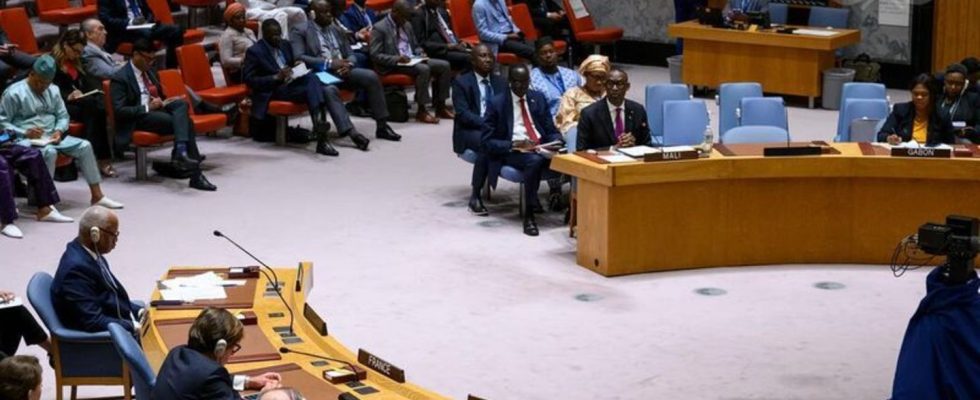West Africa
Mali demands “immediate withdrawal” from UN blue helmets
Malian Foreign Minister Abdoulaye Diop (2nd from right) speaks to the UN Security Council in New York. photo
© Loey Felipe/UN Photo/dpa
Thousands of UN peacekeepers are supposed to stabilize Mali, which is plagued by Islamists. The junta sees itself being tamed in its tough course against the terrorists. There is an open fracture.
The military government of the West African crisis state of Mali is demanding the immediate withdrawal of the UN peacekeeping mission Minusma, which has been stationed in the country for a decade.
Foreign Minister Abdoulaye Diop accused the United Nations blue helmets, including hundreds of Bundeswehr soldiers, of having become “part of the problem” instead of having reacted adequately to the security situation. “Against this background, the Malian government is calling for the immediate withdrawal of Minusma. However, the government is ready to cooperate with the United Nations in this regard,” Diop said yesterday at the UN Security Council.
“Situation where there is no peace to keep”
Mali’s transitional government under Colonel Assimi Goïta reiterated its “strategic” decision late in the evening to demand the withdrawal of Minusma. It was “impossible to keep the peace in a situation where there is no peace to keep,” she said. She accused the UN mission of having reversed the mandate to support the Malian authorities.
The military junta’s announcement came shortly before a long-awaited constitutional referendum in Mali this Sunday. Mali’s 23 million citizens are due to vote on a new constitution more than two years after the last military coup, in what is believed to be the first step towards presidential elections by next March. The interim government is campaigning aggressively for the adoption of the draft, which, among other things, gives the president more power.
Terrorist groups are spreading
The UN mission to stabilize the country has been active in Mali since 2013 after Islamist terrorists overran the north of the country on the edge of the Sahara in 2012 following the collapse of neighboring Libya and a rebellion by the nomadic Tuareg. A military intervention by the former colonial power France pushed back the Islamists, some of whom were allied with the terrorist militias IS and al-Qaeda, only temporarily. Since then, the terrorist groups have been spreading in the north and center of Mali and in its neighboring countries.
The military took power in two coups in 2020 and 2021 in the Sahel country with around 23 million inhabitants and turned to Russia, from which it promised more robust help against the Islamists. While the military junta only speaks of trainers, it is estimated that up to 2,000 Russian Wagner mercenaries are active in the country.
France then ended its military operation. Germany wants to withdraw its soldiers by May 31, 2024. The Bundestag extended the mandate for the last time at the end of May. There are currently almost 1,100 Bundeswehr soldiers in Mali. The Bundeswehr has recently been restricted again and again. For example, Bamako refused flight permits for the Heron reconnaissance drone operated by the Germans on behalf of the UN.
“Relations deteriorated since Russian arrival”
The United Nations depend on the consent of the country to operate a peacekeeping mission. The mandate of Minusma should have been extended by another year by the UN Security Council until June 30th. The head of mission and special envoy of the UN Secretary-General, El-Ghassim Wane, said in the Security Council that Minusma has done everything possible to implement its mandate in the best possible way despite the “multiple restrictions to which it is subject, including restrictions on freedom of movement”.
“Relations between Mali and MINUSMA have deteriorated since the Russians arrived. Mali does not want MINUSMA to investigate human rights abuses by the army and the Russians. The report on the Moura massacre has finally torn the tablecloth,” said the regional office head of the Konrad Adenauer Foundation, Ulf Laessing. The UN raised serious allegations in May. The report spoke of more than 500 deaths, executions and dozens of rapes in an operation by the Malian army against Islamists in March 2022 in the village in the Mopti region. Witnesses said that “armed white men” were also on site.
Difficult security situation
Mali’s foreign minister again rejected “the hasty conclusions of the biased report” yesterday. “We see in this report a real determination by some states to use our common organization as an instrument to harm or even punish Mali for its sovereign decisions,” said Diop. The junta had already put up a sharp fight back in May, saying that no civilians from Moura were killed.
The security situation, especially in the center of the country, has not improved since the government changed course. Experts observe that tougher action gives the Islamists more support. According to earlier information, around 12,000 soldiers are still deployed in Mali as part of the UN mission. The Germans are mainly deployed near the city of Gao in the northeast of the country, where there are also refugee camps with tens of thousands of people. Mali is considered the most dangerous UN peacekeeping mission. Around 170 blue helmets have died since 2013.
KAS expert Laessing said: “The withdrawal would further worsen the security situation. Minusma is also building schools, equipping police stations – it is replacing the state, which is not present in the area. Thousands would be unemployed overnight, who for lack of alternatives would turn to bandits or jihadists would join.” Minusma provides security in cities where internally displaced people move to escape the terrorist militias. “They would then continue to flee to Niger and on the Libya route.”

